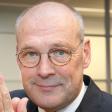
Rutger Jan Van der Gaag
Prof. (emeritus) Rutger Jan van der Gaag
MD PhD HonFRCPsych.
Abstract
Psychosomatics: an expressive style that runs in families
Psychosomatics is an important issue in medicine. Whilst many patients have clear-cut somatic or psychiatric diagnoses, the vast majority of patients seen in primary and increasingly in secondary care present with so called “medically unexplained symptoms”. The idea that mind and body are distinct is an awkward assumption introduced by Descartes long ago and yet still running in many minds. No so called somatic condition does not come along with anxiety and stress, and conversely anxieties, or a depressed mood will express themselves most often through physical complaints. These may range from headaches, dizziness, short-breathness, pain in the chest or in the belly, aches in limbs etc. In old days doctors were more comfortable assessing the stressful circumstances that the patient in his or her context was facing. Nowadays the patient has often googled his symptoms and has all kind of somatic fears, that are easily reinforced by doctors spending more attention to lab and imaging tests that really looking into what is wrong. As there is still a stigma on mental conditions many patients prefer to have a somatic diagnosis rather than a psychosomatic one. A vast body of research shows that the style of expressing emotions through physical complaints runs in families and gets reinforced as from childhood. Though psychotherapy is very potent in psychosomatics, a family assessment and family therapy is a strongly evidence based approach to these conditions.
Biography
Rutger Jan van der Gaag (1950) grew up in England (Kent) and France where he obtained his Baccalauréat (mention très bien) in Saint Germain en Laye in 1968.
He studied medicine in Utrecht (the Netherlands) where he graduated as an MD 1975 and accomplished his PhD in 1993 “Multiplex Complex Developmental Disorders: an exploration of the borderlines on the autistic spectrum”. After military service (reservist until 2010 Lt Colonel) and training as a General Practitioner, he specialized in psychiatry and child & adolescent psychiatry.
He qualified as consultant in 1982 and was an associate professor member of the staff at the University Medical Centre Utrecht until 1995
From 1995-2002 he was director of Training at Meerkanten GGz in Ermelo. There he pursued his research activities in the field of Developmental Psychopathology (partly as an invited visiting scholar at Child Study Center, Yale University).
From 2002 until reaching the emeritus status in 2016 he was full professor of psychiatry (child & adolescent), head of the department of child & adolescent psychiatry and psychology, director of training and research principal at the University Medical Centre St. Radboud and Karakter University Centre for Child & Adolescent Psychiatry at the Radboud University in Nijmegen (the Netherlands).
His research topics are developmental disorders (Autism – ADHD), addiction, vulnerability to psychosis {schizophrenia}, healthcare especially integration of body and mind, and service development and health policies.
He has published over a hundred articles and book chapters on these topics. He holds guest professorships in many European countries, and is advisor to Autism Societies all over the world. As from 1989 he is a regular Visiting Scholar at Yale Child Study Centre New Haven CT. He is and has been a reviewer for the highest impact journals in his field.
He was been elected member of the American Academy of Child and Adolescent Psychiatry (1989) and the American Psychiatric Association (2002)
Recent carrier, amongst others:
- 2008-2012 President of the Netherlands Psychiatric Association.
- 2010-2013 Vice-president of the Council of National Psychiatric Association at the European Psychiatric Association. After having brought the National Psychiatric Associations of Europe to the European Psychiatric Association
- 2013-2016 Board member European Psychiatric Association
- 2009-2011 Member of the Regional WHO Europe working group on Mental Health
- 2012 -2016 President of the Royal Dutch Medical Association
- 2015-2017 Member of the Council of the World Medical Association (Geneva)
- 2015 - 2017 Vice-president of the Conseil Permanent des Médecins Européens
- 2017 - 2018 Chair of the TaskForce Social Integration of (Homeless) people with Severe Mental Disorders Nijmegen & Gelderland Zuid
- ….
Current Positions
- 2015 - Member of the EU in platforms of DG Santé on Obesity Prevention, Alcohol and Tobacco regulations
- 2014- Chair of the Netherlands Surveillance commission on Anti-microbial resistance (AMR) and European rapporteur on AMR and Vaccination.
- 2016- Chair of the Papageno Foundation (Autism & Quality of Life)
- 2016 – ProRector of the Radboud University Nijmegen
- 2016 – Faculty Member “Fondazione Child” Bologna Italia
- 2017 – Board of “Eindspel Tabak” (Stopping Tobacco Usage amongst Youth)
- 2017 - Professor of Psychosomatics & Psychotherapy, Stradina University Riga Latvia
- 2018 - Member of the evaluation panel research in medicine ZonMw
- 2019 - Member of the Board of Supervisors Vincent van Gogh Institute for Mental Health Limburg (the Netherlands)
- ….
Honours
- 2012 Honorary Life Member of the Dutch National Autistic Society
- 2012 National Biennale Prize of the Dutch Foundation for Mental Health
- 2013 Honorary fellowship of the Royal College of Psychiatry (UK)
- 2014 Honorary Life President/Member Netherlands Psychiatric Association
- 2016 Officer in the Royal Order of Oranje-Nassau (2016)
- 2017 honorary member of the World Psychiatric Association
- 2018 Distinguished International Fellow of the American Psychiatric Association
Rutger Jan van der Gaag has been married to Madeleine M. Wolhoff (DVM, LL.M; Emeritus Dean of a vocational school for animal nursing) since 1975. Their three grown up children live with their families scattered over the world according to an ancient family tradition.
